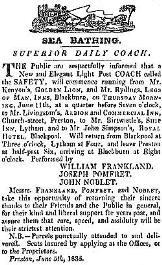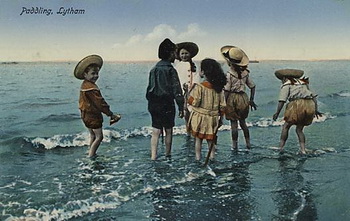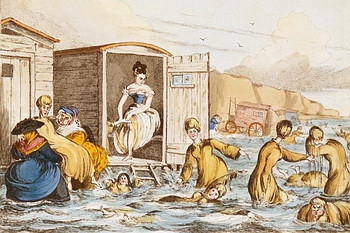|
 The health benefits of mineral springs such
as those at Bath and Buxton were already well-known in the eighteenth century.
As early as 1707 doctors believed that bathing and drinking sea-water also had
great health benefits. The health benefits of mineral springs such
as those at Bath and Buxton were already well-known in the eighteenth century.
As early as 1707 doctors believed that bathing and drinking sea-water also had
great health benefits.
Between 1789 and 1805, King George III visited Weymouth no less
than 14 times for this very purpose to help cure his ‘nervous disorder'. This
helped popularise sea bathing and around the British coast villages such as
Lytham started to attract visitors in ever-increasing numbers.
|
1850
CAUTION TO KEEPERS OF BATHING
MACHINES
On Tuesday last at the Kirkham Petty Sessions,
the owner of a bathing machine at Lytham, was fined 1s. and costs
amounting to 9s.6d. under the Lytham Bye Laws, for taking down
three gentlemen to bathe within the limits prescribed by the Bye
Laws for females. The Preston Guardian, Saturday, July 13,
1850
|
|
1831
SWIMMING FEAT
On Tuesday last, Dr. Bedale, of Manchester, in
compliance with his previous announcement, exhibited in presence of
several hundred spectators, some of his peculiar and surprising
feats in the waters of the Ribble.
Soon after twelve o'clock, he appeared in a boat a short distance
below Penwortham Bridge, and ha¬ving provided himself with a
suitable garment, his legs were tied together, and he was thrown
headlong into the stream, from which he soon rose and floated in
different postures with the apparent lightness of a log of wood,
and without any perceptible exertion. In this manner, and
afterwards in a variety of postures, he swam and floated towards
Avenham and returned with the ebb, to the gratification of the
curious. –
In the afternoon he proceeded to Lytham to confer a
similar-gratuitous treat upon the visitants to that place, - where
he would find a wider scope for his skill in “wrestling with the
ocean wave."
Preston Chronicle, Saturday, 13th August, 1831
|

|
1852
MELANCHOLY DEATHS FROM DROWNING AT
LYTHAM.
On Sunday (August 1st) last, two unfortunate and
fatal accidents occurred in the sea at Lytham, by which two young
men, one named John Heskin, piecer in a cotton mill at Preston, and
James Mullin, stay-maker, of aged 19 of Thomas Street, Manchester,
lost their lives.
The ill-fated individuals were bathing at the
time; cramp seized them, and they were swept away by the rapid
current, and drowned. The bodies were recovered, and an inquest was
holden on Monday before R. Palmer, Esq., coroner.—Verdict,
“Accidentally drowned."
|
|

Bathing machines could be hired at the Lytham Beach and some bathing machine
keepers even operated a service from the door of the lodging house, through
the streets, to the sea shore.
Bathing in the sea at Lytham could be dangerous;
there were several deaths over the years.
1857
TWO MEN DROWNED AT
LYTHAM.
A deplorable accident, by which two men,
named William Farrow and James Earnshaw, lost their lives,
occurred at Lytham on Saturday last. The deceased had come from
Oldham by at excursion train, and after enjoying themselves
with others for some time in Lytham determined to bathe.
Accordingly, about one o'clock in the afternoon, they and two
companions, Archibald Booth and James Lees, hired a bathing
machine, which was driven into the water. The tide was running
out strongly at the time, and immediately the horse had been
taken from the machine by the owner, John Parkinson, the van
came down what is called the "steep breast" into deep
water.
Farrow jumped into the water, and was drowned; the other three
climbed the roof of the van, but Earnshaw afterwards leaped off
into the water with the intention of swimming to the beach, but
the current and the ebbing tide were too strong for him, and he
was swept back by the retiring waves and drowned in the
presence of a great number of persons.
Booth and Lees were then rescued by some men who went to their
assistance in boats. Earnshaw, a self-actor minder¹, and about
20 years of age, was a single man; Farrow, a carder², was
married, and has left a widow and one child. The bodies of the
unfortunate deceased were afterwards recovered, and conveyed to
the Talbot Arms Inn, where Mr. Myres, coroner, held an inquest
on Monday.
Evidence was given that the place used for men's bathing at
Lytham was very dangerous during ebbing tides.--Margaret
Candlish, a keeper of bathing vans, said she had nearly lost
her life there five years ago, and she strongly urged moving
both the men's and the women's bathing places 150 yards lower
down the west beach.
On Saturday, just before the accident, she had complained of
the danger to Police-sergeant Ponsonby, who told her she might
remove her vans further west. She did so, and then Jump, a
policeman (instructed by Mr. Hayes, a commissioner), told her
if she did not replace her vans he would summon her. She
refused, however.—Jump corroborated this witness.—The foreman
of the jury said he narrowly escaped drowning at the same place
about thirty years ago.
The jury, in giving a verdict of "Accidental
death," declared their opinion that the place for men bathers
was very dangerous in ebbing tides, and recommended an
immediate change of place, and that, meanwhile, the police
should prevent bathing there.
The
Preston Guardian, Saturday, June 13,
1857
¹ self-actor
minder -He
w atched and minded the
'Self Acting Mule' - the name of a multi thread spinning
machine. The original Mule was hand operated and was invented
by Samuel Crompton of Bolton in 1779. It was made self-acting
by Richard Roberts in 1830 .
²
Carder - He had a skilled job combing
cotton or wool.
|
|